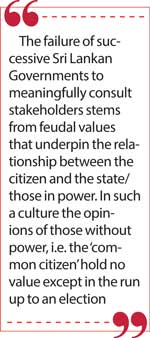In August 2025, the Government issued a public notice calling for submissions from the public and local and international media on amendments to the Online Safety Act No. 9 of 2024 (OSA). In May 2025, the Government issued a similar public call for comments and recommendations on repealing the Prevention of Terrorism Act (PTA). These are positive steps. However, although the Government called for public submissions, there has been no dialogue to date with those that made submissions regarding the PTA. For instance, my submission on the PTA was not even officially acknowledged. The Government’s good intentions notwithstanding, if consultations are not inclusive and meaningful, they will be viewed as a ticking the box exercise.
The more things change, the more they stay the same?
Every Sri Lankan Government is guilty of not consulting meaningfully with stakeholders. In the past, consultations on legislative reform, when held, were rarely inclusive, and recommendations made by stakeholders were largely or completely ignored. The most recent example is the current Government completely disregarding the collective demands for the repeal of the OSA and instead seeking to amend it. Since the reasons for repeal rather than amendment are many and are publicly available, they will not be revisited here.
In February 2025, at a meeting organised by a non-governmental organisation, journalists, media collectives and civil society organisations presented the reasons the law should be repealed to the Government, which was represented at the meeting by a few ministers and deputy ministers. Furthermore, they unequivocally demanded the repeal and not amendment of the law. Yet, it appears none of those concerns were considered as the Government continues to assert it will amend, not repeal the law.
The call for submissions on the OSA should not go the way of the call for recommendations on the PTA. Instead, the Government should hold consultations at least with those that made submissions. This is particularly important because it appears that those who use the OSA are largely Government members who file police complaints about false information being spread about them with the alleged intention of defaming them. In this context, if the Government fails to hold consultations, it will appear that calling for public submissions is not genuine.
A short history of the failure to consult
The main justification provided by the current Government for not dialoguing with stakeholders is that it will take considerable time, and requirements, such as those attached to the GSP Plus trade privileges granted by the European Union (EU), compel the Government to repeal and replace the PTA as soon as possible. However, it is highly doubtful that the EU and other entities, such as the UN, will take issue with the reform process taking longer if it includes meaningful and inclusive consultations, particularly on human rights deficient laws such as the PTA.
A quick study of consultations held by previous Governments highlights certain patterns of exclusion. Some stakeholders, such as those from the North and the East, are most often excluded in the limited consultations (one meeting at most) that have sometimes taken place, while well-known Colombo based organisations are nearly always included. In other instances, invitations to meetings are issued at short notice, even the day prior to the meeting, which prevents persons, especially those not based in Colombo, from participating.
Secretariat for Truth and Reconciliation Mechanisms
For example, during Ranil Wickremesinghe’s presidency, the Interim Secretariat for Truth and Reconciliation Mechanisms (ISTRM) held a consultation with mainly Colombo civil society organisations and only a couple of Tamil activists. It is only when the exclusion of the Tamil community was publicly raised that they held a follow-up meeting to which persons from the North and East were invited. A mere two meetings with a small group of civil society activists were considered adequate regarding establishing a mechanism to address violations related to the 30-year-old armed conflict. While the ISTRM publicised these consultations to demonstrate they were consulting affected communities and civil society, the request of many civil society organisations, activists and victims, particularly from the war affected North and East, not to establish yet another truth commission and instead implement the recommendations of previous commissions, was not heeded.
 During the Gotabaya presidency, although the Parliamentary Select Committee on Alternatives to Imprisonment held consultations, it led to no tangible action. The Parliamentary Select Committee to ‘Control and Eradicate the Drug Menace’ headed by the then Minister of Public Security Tiran Alles, which called for submissions did not acknowledge receipt of submissions made by civil society organisations that work on human rights, nor did it invite them for discussions with the Committee. Religious organisations and entities with regressive policies on the drug issue were however invited to meet with the Minister.
During the Gotabaya presidency, although the Parliamentary Select Committee on Alternatives to Imprisonment held consultations, it led to no tangible action. The Parliamentary Select Committee to ‘Control and Eradicate the Drug Menace’ headed by the then Minister of Public Security Tiran Alles, which called for submissions did not acknowledge receipt of submissions made by civil society organisations that work on human rights, nor did it invite them for discussions with the Committee. Religious organisations and entities with regressive policies on the drug issue were however invited to meet with the Minister.
Successive Sri Lankan Governments have also had kitchen cabinets which played a critical role in legislative reform. During Yahapalana the process of drafting laws on issues related to the war, such as the law on the Office on Missing Persons and the proposed truth commission, was done by an informal/unofficial group of persons who were gathered by the then Prime Minister. These persons were not officially appointed as members nor were these groups formally established. Those who knew the persons had the opportunity to engage with them and advocate, while the affected community, i.e. the Tamils, had no knowledge of the existence of this group nor had access to it. The group did not consult with civil society or the affected communities.
Even the Human Rights Commission of Sri Lanka (HRCSL) was not provided the draft law on the Office on Missing Persons despite requesting it numerous times and had access to it only when it was gazetted. It should be noted the HRCSL is legally mandated to review draft laws to ensure they adhere to international human rights standards.
MR era
Informal consultations were held during Mahinda Rajapaksa’s tenure too when certain ministries, such as the Ministry of Women’s Affairs consulted women’s rights organisations on the Prevention of Domestic Violence Act. The invitees however were limited to organisations the Ministry/Secretary knew, which was inevitably groups in Colombo.
A process of inclusive and meaningful consultations was initiated for the first time in the history of Sri Lanka during the Yahapalana government with the establishment of the 11-member Consultation Task Force on Reconciliation Mechanisms (CTF) and the 19-member Public Representations Committee on Constitutional Reform (PRC). The CTF published a 527 page report with detailed recommendations based on 1,386 focus group discussions, 4,872 public meetings and 1,048 written submissions. The CTF also had two advisory panels; the 15 zonal task forces, which conducted consultations at the district level and a panel of experts.
The PRC published a 333 page report after consulting 2,500 organisations and individuals and receiving 1,710 written submissions. Yet, both these reports are amongst the scores of reports with progressive unimplemented recommendations that gather dust. This is due to a common trait of Governments of ignoring reports by previous Governments and reinventing the wheel thereby wasting time and resources.
What drives the failure to meaningfully consult stakeholders?
The failure of successive Sri Lankan Governments to meaningfully consult stakeholders stems from feudal values that underpin the relationship between the citizen and the state/those in power. In such a culture the opinions of those without power, i.e. the ‘common citizen’ hold no value except in the run up to an election.
This political culture shapes civil society engagement with the Government as well. Some organisations, such as long-standing, well-known urban based organisations, avoid critiquing the Government for fear it will result in them losing access to the Government. In the past this fear has prevented civil society organisations from fulfilling their watchdog role and holding the Government to account.
If the current Government is to be true to its claim it is a people’s government, it must consult stakeholders in a transparent and inclusive manner. When it establishes committees on law reform, it must provide public updates on the progress made by such committees including the laws they used as reference, the experts, both local and international, they consulted, etc. Consultations should be held before and after the drafting process and ideally, a white paper should be published on critical laws, followed by consultations with stakeholders before a bill is gazetted.
